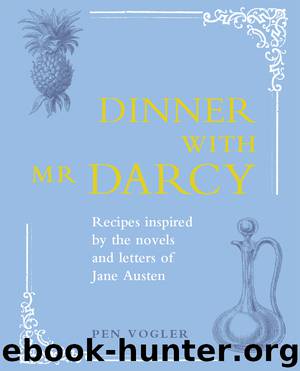Dinner with Mr Darcy by Pen Vogler

Author:Pen Vogler
Language: eng
Format: epub
Publisher: Ryland Peters & Small
Published: 2020-01-21T16:00:00+00:00
Butter Buns Put 1⁄4 lb of butter into 2 lbs of flour, a 1⁄4 lb of sugar, a handful of currants, two spoonfuls of good yeast. Set it to rise before the fire. Add the yokes of two eggs and about a pint of warm milk, mix into a limp paste and make it into forty buns.
MARTHA LLOYD’S HOUSEHOLD BOOK
SERVANTS
Daniel Defoe once mistook a maid for a mistress and was so mortified by his mistake he wrote an attack on maid-servants for their dishonesty, insolence, and extravagance, recommending a strict cut in wages in order to keep them in their place (Defoe, Everybody’s Business is Nobody’s Business, London, 1725). The rest of the eighteenth century saw the beginnings of a new fluidity in class structure, which made relations between demanding employers (particularly of the new “middling sort”) and uppity servants increasingly fractious. Jonathan Swift also waded in to the attack with his Directions for Servants, in which his satirical recommendations include pilfering, loitering, wiping dirty shoes on the bottom of a curtain, blaming your mistress if the meal is late, or—my favorite—“If a Lump of Soot falls into the Soup, and you cannot conveniently get it out, stir it well, and it will give the Soup a high French Taste.”
The servants’ day was a very long one, starting long before their employers’ leisurely 9 a.m. breakfast and ending only when the last scraps of their late evening dinner had been cleared away. The Austen ladies generally had a manservant and two maids, with additional help for washing and cooking, but finding and training good servants was never straightforward. Like Mrs. Price, plaintively asking Fanny whether her sister Lady Bertram was “as much plagued as herself to get tolerable servants,” Jane reports problems with a manservant who drank, or being without a second maid or, more happily, a promising new maid, who although she knew nothing of dairying, “is to be taught it all.”
Like Mrs. Bennett, tartly informing Mr. Collins that none of her daughters cooked the dinner, the ladies of the Austen household would not have done the physical work of brewing, preserving, dairying, baking, and cooking, but gave expert supervision to the servants. When she was unwell, Mrs. Austen handed over the housekeeping to Cassandra with Jane as deputy, which she enjoyed, writing, during Cassandra’s absence, “I am very grand indeed… I carry the keys of the wine and closet, and twice since this letter began have had orders to give in the kitchen. Our dinner was very good yesterday, and the chicken boiled perfectly tender; therefore I shall not be obliged to dismiss Nanny on that account.” (Letter, October 27 1798.)
Servants, particularly women, were paid very little; a housemaid received about £5 per annum, a cook about £8–10 per annum. Male servants had a higher status: a French (male) cook might be paid £50-60 per annum. Jane’s favorite brother, Henry, had a French cook called Monsieur Halavant, and Jane asked Cassandra, on a visit to Henry in London
Download
This site does not store any files on its server. We only index and link to content provided by other sites. Please contact the content providers to delete copyright contents if any and email us, we'll remove relevant links or contents immediately.
| Eastern European | English, Scottish & Welsh |
| French | German |
| Greek | Hungarian |
| Irish | Italian |
| Mediterranean | Polish |
| Portuguese | Russian |
| Scandinavian | Spanish |
| Turkish |
Biscuits: A Savor the South Cookbook by Belinda Ellis(4341)
The French Women Don't Get Fat Cookbook by Mireille Guiliano(3661)
A Jewish Baker's Pastry Secrets: Recipes from a New York Baking Legend for Strudel, Stollen, Danishes, Puff Pastry, and More by George Greenstein(3601)
Better Homes and Gardens New Cookbook by Better Homes & Gardens(3595)
Ottolenghi Simple by Yotam Ottolenghi(3594)
Al Roker's Hassle-Free Holiday Cookbook by Al Roker(3532)
Trullo by Tim Siadatan(3430)
Bake with Anna Olson by Anna Olson(3404)
Hot Thai Kitchen by Pailin Chongchitnant(3387)
Panini by Carlo Middione(3339)
Nigella Bites (Nigella Collection) by Nigella Lawson(3233)
Momofuku by David Chang(3188)
Salt, Fat, Acid, Heat: Mastering the Elements of Good Cooking by Nosrat Samin(3147)
Modern French Pastry: Innovative Techniques, Tools and Design by Cheryl Wakerhauser(3141)
Classic by Mary Berry(3014)
Best of Jane Grigson by Jane Grigson(3000)
Tapas Revolution by Omar Allibhoy(2983)
Solo Food by Janneke Vreugdenhil(2976)
Ottolenghi - The Cookbook by Yotam Ottolenghi(2946)
